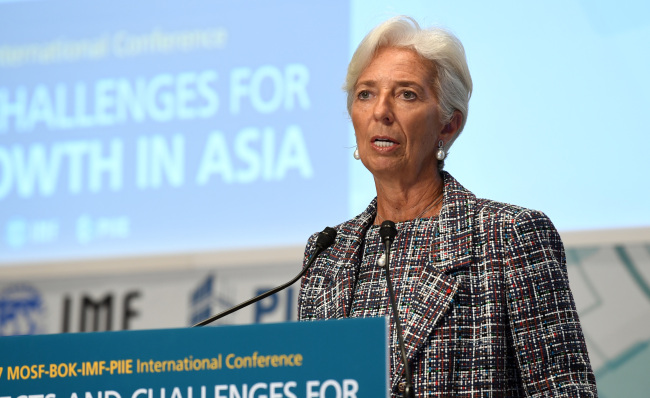Boosting female workforce is solution to aging society problems: IMF chief
‘Closing gender gap in labor market could become economic game-changer in Asia’
By Bae Hyun-jungPublished : Sept. 7, 2017 - 19:26
Christine Lagarde, managing director of the International Monetary Fund, on Thursday asserted that the most effective solution to Asia’s aging population and consequent productivity decline is to boost the proportion of women in the workforce.
“Korea and Japan, for example, could further increase their focus on reforming secondary earner taxation and boosting child care benefits and tax incentives for part-time work,” Lagarde said in a speech at a conference addressing the challenges faced by Asian economies.
“Korea and Japan, for example, could further increase their focus on reforming secondary earner taxation and boosting child care benefits and tax incentives for part-time work,” Lagarde said in a speech at a conference addressing the challenges faced by Asian economies.

The two-day event, titled Prospects and Challenges for Sustained Growth in Asia, was held at Four Seasons Hotel Seoul, co-hosted by the Ministry of Strategy and Finance, Bank of Korea, Peterson Institute for International Economics and the IMF.
Adding that secondary earners within an economic community are always women, Lagarde claimed such an initiative would not only hold a social significance, but also be an economic game-changer.
“Closing the gender gap in the labor market could boost the gross domestic product by 9 percent in Japan, 10 percent in Korea, and 27 percent in India,” she said.
South Korea, China and Japan could face a shortage in workforces and lower productivity as a result of an aged society, the official pointed out, in line with the IMF’s earlier warning that parts of Asia have “the risk of getting old before becoming rich.”
Earlier this week, data from the Ministry of Interior and Safety showed that the number of South Korean nationals aged 65 or over accounted for 14 percent as of the end of August this year. Reaching the 14 percent mark defines a society as aged.
Bank of Korea Gov. Lee Ju-yeol shared the IMF top official’s concerns about the negative impact caused by demographic changes.
“A failure in responding to population aging will make the escape from possible structural low growth difficult,” the central bank chief said, adding the region is not ready for a sharp drop in workforces.
Vice Finance Minister Ko Hyoung-kwon said that Asia, despite its status as the most dynamic economy, must also recognize its vulnerability to external risk factors.
The IMF chief also expressed support for inclusive growth and consumption-led growth, which constitute the core of South Korean President Moon Jae-in’s economic blueprint.
“We have seen benefits from fostering more inclusive growth, especially in countries where income and wealth inequality are high and rising. To put it simply, growth is stronger, more durable, and more resilient in places where the benefits of growth are shared more broadly,” she said.
Referring to Seoul’s recently approved state budget to expand welfare programs, Lagarde said building a stronger social safety net is the equivalent of increasing the “fitness level” of an economy.
(tellme@heraldcorp.com)
Adding that secondary earners within an economic community are always women, Lagarde claimed such an initiative would not only hold a social significance, but also be an economic game-changer.
“Closing the gender gap in the labor market could boost the gross domestic product by 9 percent in Japan, 10 percent in Korea, and 27 percent in India,” she said.
South Korea, China and Japan could face a shortage in workforces and lower productivity as a result of an aged society, the official pointed out, in line with the IMF’s earlier warning that parts of Asia have “the risk of getting old before becoming rich.”
Earlier this week, data from the Ministry of Interior and Safety showed that the number of South Korean nationals aged 65 or over accounted for 14 percent as of the end of August this year. Reaching the 14 percent mark defines a society as aged.
Bank of Korea Gov. Lee Ju-yeol shared the IMF top official’s concerns about the negative impact caused by demographic changes.
“A failure in responding to population aging will make the escape from possible structural low growth difficult,” the central bank chief said, adding the region is not ready for a sharp drop in workforces.
Vice Finance Minister Ko Hyoung-kwon said that Asia, despite its status as the most dynamic economy, must also recognize its vulnerability to external risk factors.
The IMF chief also expressed support for inclusive growth and consumption-led growth, which constitute the core of South Korean President Moon Jae-in’s economic blueprint.
“We have seen benefits from fostering more inclusive growth, especially in countries where income and wealth inequality are high and rising. To put it simply, growth is stronger, more durable, and more resilient in places where the benefits of growth are shared more broadly,” she said.
Referring to Seoul’s recently approved state budget to expand welfare programs, Lagarde said building a stronger social safety net is the equivalent of increasing the “fitness level” of an economy.
(tellme@heraldcorp.com)









![[Kim Seong-kon] Democracy and the future of South Korea](http://res.heraldm.com/phpwas/restmb_idxmake.php?idx=644&simg=/content/image/2024/04/16/20240416050802_0.jpg&u=)







![[KH Explains] Hyundai's full hybrid edge to pay off amid slow transition to pure EVs](http://res.heraldm.com/phpwas/restmb_idxmake.php?idx=652&simg=/content/image/2024/04/18/20240418050645_0.jpg&u=20240418181020)

![[Today’s K-pop] Zico drops snippet of collaboration with Jennie](http://res.heraldm.com/phpwas/restmb_idxmake.php?idx=642&simg=/content/image/2024/04/18/20240418050702_0.jpg&u=)